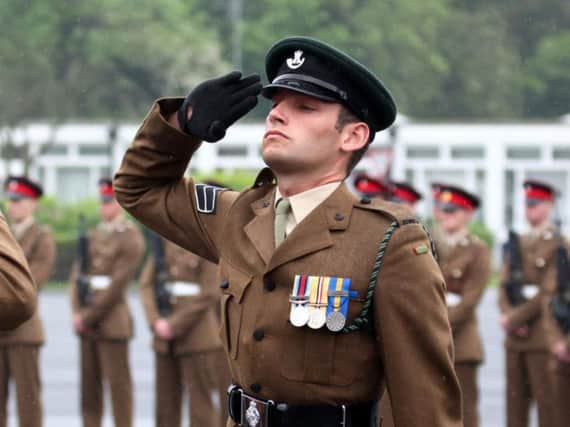Officer made 'hot day' remark to soldier months after Scots corporal's fatal march, inquest told


Corporal Joshua Hoole, described as "fit, capable and determined", died within an hour of collapsing during an annual fitness test (AFT) at Brecon, Wales, on the morning of July 19, 2016.
Cpl Hoole, of Ecclefechan, near Lockerbie, Dumfries and Galloway, died three years after three Army reservists suffered fatal heat illness during an SAS selection march in the Brecon Beacons.
Advertisement
Hide AdAdvertisement
Hide AdOn Tuesday, an inquest into Cpl Hoole's death heard from another soldier, Corporal George Knight, who collapsed with a suspected "heat injury" earlier on the same march.
But in 2017, while on another "eight-miler" test march, Cpl Knight again came across Captain Colin Nufer - the officer who had been running the march the day Cpl Hoole died.
Mr Basu said: "While conducting an eight-mile loaded march, he said words to the effect 'I'm surprised you're still here, as it's a hot day'.
"Yes," replied Cpl Knight.
Mr Basu asked: "What was his tone of voice?"
"Normal tone of voice - it wasn't aggressive," said Cpl Knight.
Cpl Knight previously told the inquest on Monday how he reported Capt Nufer to the military police after an alleged incident in 2018.
The corporal claimed he was approached by the same officer to help "change" witness statements made about how he came to collapse in a hedgerow on the day of the fatal march.
Mr Basu asked: "He takes you to one side, you go to his office and he says he wants to clear some stuff up - a deep and meaningful chat.
"What was his tone of voice?"
Cpl Knight replied: "It was a normal tone of voice."
He added: "I didn't know really what to do, that's why I was in contact with the Royal Military Police."
Advertisement
Hide AdAdvertisement
Hide AdAsked if he did try and get people to change their statements, he replied "no", adding "I don't know of anyone else (being asked to), as far as I know".
Capt Nufer is due to give evidence to the inquest later this week and disputes the account given by Cpl Knight, the hearing has been told.
At Birmingham Coroner's Court, Cpl Knight told how about an hour into the AFT he was "struggling to focus and felt sick", before collapsing "into the hedge".
He described the march group as "experienced" and said those allowed to go on the regimental training team's "eight-miler" were hand-picked as being among the fittest.
The corporal considered himself "in the top-third" fittest in the unit, but had missed out on some of the physical preparation before the AFT, because he was on an Army exercise.
Several soldiers have testified about a "myth" surrounding the Dering Lines course, describing it as a "perception" among soldiers that it was one of the toughest.
The inquest has also heard evidence of the heat that day, with one soldier telling how colleagues were "moaning it was too hot" early in to the march.
Former soldier Shane Pendall said it was "roasting" on the day and was told by the medic he had "started to go white" after completing the march's steep incline.
Advertisement
Hide AdAdvertisement
Hide Ad"I just felt uncomfortable, I've seen quite a few people go down with heat on operations," he told the coroner.
"I wouldn't say it got that far - if I had carried on, I could potentially be a heat casualty."
The medic told him to withdraw and "get on the wagon" - an Army minibus that was shadowing the group, picking up those dropping out.
By the time Mr Pendall came off, 10 soldiers or almost a quarter of those on the march had by then dropped out.
In all, 18 out of the 41 junior non-commissioned officers collapsed, had to pull out or were withdrawn.
The inquest heard evidence on Tuesday presented by Cpl Hoole's father Philip Hoole, from Carlisle, that the Ministry of Defence's recorded average drop-out rate on the same march route in 2015 had been just 3%, out of 708 participants.
The inquest continues.
For unlimited access to Scotland’s best news, sport and expert analysis, SUBSCRIBE to The Scotsman website here